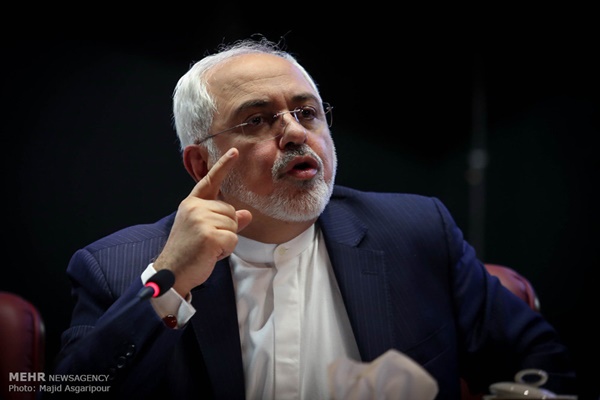Addressing the business community in Tehran Chamber of Commerce, Industries, Mines and Agriculture, Iranian Foreign Minister said, “I believe that the nuclear deal is not facing any serious dangers provided we work to keep it alive,” he said, adding that preserving the deal is not synonymous with “mentioning it every single day”.
“Some think I am ashamed of the nuclear deal–known by its acronym JCPOA–but the truth is that I am very proud of it.”
The top diplomat noted that arguing over the merits and demerits of the accord would be meaningless, because the Joint Comprehensive Plan of Action is now part of the world reality, Financial Tribune reported.
The country’s top diplomat also referred to the snapback provision–which makes it possible for the US and other parties to instantly bring back sanctions if Iran violates the deal– and said the provision indicated the nuclear agreement had been reached on the basis of mutual distrust.
“On our part, snapback means that we can resume our nuclear programs anytime we want to but that is not the same for the other party because it will take time for them to re-implement the sanctions,” he said.
“Snapback is there so that that all parties abide by the deal.”
Zarif added that the way to use the snapback measure to Iran’s advantage was to increase interactions with the international community because the Islamic Republic of Iran is now an active player on the world’s stage.
Zarif, who was Iran’s chief negotiator in the marathon nuclear talks that led to the signing of the deal in July 2015 between Tehran and the P5+1 (the five UN Security Council permanent members plus Germany), has had a hard time defending the deal in the face of criticism from domestic hardliners who complain Iran made too many concessions and gained little in return.
The private sector, largely welcoming the lifting of restrictions that had made foreign commerce a complicated and risky venture, also bemoaned the slow undoing of sanctions, especially in the banking sector.
Business Normalcy
The board members of TCCIMA appreciated Zarif’s efforts on Tuesday, showering him with praise for saving the country from the brink of economic meltdown but also suggesting that more efforts are needed to capitalize on the benefits of the post-sanctions era.
Clearing the remaining banking hurdles, easing dollar transactions, joining the World Trade Organization and reaching visa waiver agreements were among the points raised by the business community.
Zarif noted that just as the imposition of western-led sanctions on Iran had been gradual, the process of easing them would also come in fits and starts.
“It took the EU six months to prepare its oil embargo on Iran and just as it took the banking system’s corresponding relations to drop from 670 in 2010-11 down to 50 [just before the nuclear pact was clinched], the process of scaling them back [to pre-sanctions levels would need time,” he said.
“And when it comes to the banking sanctions, we should note that when Iran was removed from the global banking scene, the world was reeling from the 2008 financial crisis. Hence our banks were kept away from all the developments and changes that were taking place in the sector.”
He further said some of the remaining hurdles are rooted in measures passed well before the nuclear controversy began.
For instance, sanctions on U-turn transactions, which allowed US banks to process dollar-denominated transactions on Iran’s behalf as long as the payments were initiated offshore by a non-Iranian foreign bank and only passed through the US financial system en route to another non-Iranian foreign bank, were enforced in the 80s and 90s.
Or the Iran Sanctions Act–formerly known as D’Amato Sanctions, which were recently extended by US lawmakers, dates back to 1996 when it was introduced by Senator Alfonse D’Amato.
Stressing that the nuclear agreement succeeded in rolling back the nuclear-related sanctions, the foreign minister noted that the deal’s biggest merit has been its ability to end the negative psychological impression about doing business with Iran.
Zarif asked the business community to not let the many benign achievements of the historic deal to lose momentum in the face of adverse propaganda.
“This will take hard works and to a certain degree, risk-taking,” he said.
